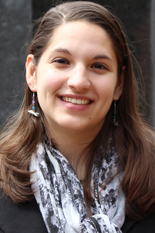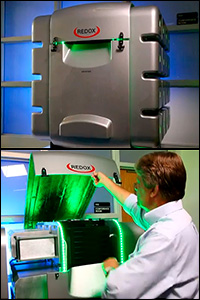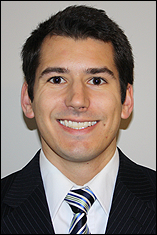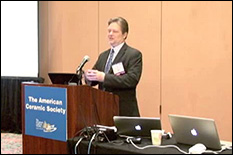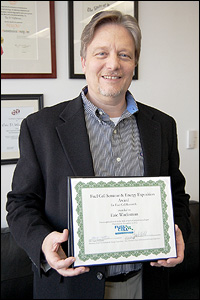News Story
Foundation Supports Gore's Efforts to Improve Fuel Cells
Clark School Department of Materials Science and Engineering (MSE) graduate student Colin Gore, advised by MSE professor and University of Maryland Energy Research Center director Eric Wachsman, has been awarded a 2012-2013 Achievement Rewards for College Scientists (ARCS) Hesse Endowment Fellowship for his proposal to improve the fuel flexibility of low-temperature solid oxide fuel cells (SOFCs).
Unlike the more familiar proton exchange membrane (PEM) fuel cells, SOFCs can convert any kind of fuel into electricity—not just hydrogen—and do it far more efficiently than steam or internal combustion engines. Gore is part of a larger team of researchers in Wachsman's group working to make SOFCs more powerful while reducing their operating temperature and production costs.
"Engineered properly, SOFCs can be the most efficient…power sources for vehicles, homes, or entire cities, depending on the size of the fuel cell stack," says Gore. Companies such as Bloom Energy have already commercialized SOFC boxes that are being used by Google, Walmart, and other high-profile customers. Gore describes the SOFCs designed by his group as belonging to the next generation of products, which will address certain problems and shortcomings.
Conventional SOFC anodes are prone to accumulating carbon deposits when they are operated using hydrocarbon fuels like gasoline. Eventually, the carbon clogs the cell, which results in a loss of power. To address the problem, Gore has developed a novel anode composed of layers of multiple materials that meet different demands in different regions, have the necessary conductivity, and are immune to carbon deposits.
Gore says his ARCS fellowship is not only a great honor, but will also provide additional support for his research by funding the equipment he will use to model reformed hydrocarbon fuels and to assess his anodes' power and stability under different operating conditions.
Watch an interview with Colin Gore, in which he explains his research and goals. Video courtesy of UMERC.
Gore, who received his B.S. in materials science and engineering from Lehigh University, describes himself as a "broadly curious" person who was attracted to the field's many practical applications and interdisciplinary approach to research. He chose the University of Maryland and the Clark School so he could study under Wachsman, an expert in SOFCs.
"He has a keen perspective on the societal energy issues that drive his research," says Gore, "so I know my work has focused potential for meaningful impact."
Sponsored by the Metropolitan Washington Chapter of the ARCS Foundation, Inc., ARCS fellowships provide outstanding students in science, medicine and engineering with a renewable award of $15K per year to support their contributions to the advancement of their fields. Each year, the Foundation also provides an endowed ARCS Fellowship to a student in a selected field of study.
Gore's fellow MSE graduate student and ARCS Scholar Jane Cornett, advised by MSE Assistant Professor Oded Rabin, had her fellowship renewed.
For more information about the ARCS Scholars program, visit the ARCS Foundation web site.
Published April 2, 2012



